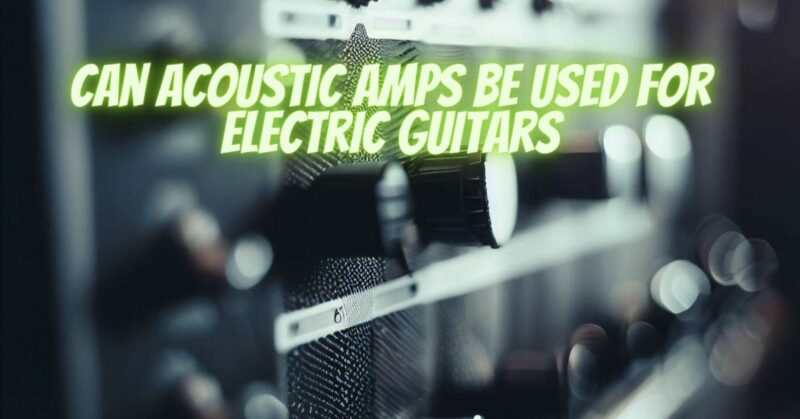In the world of music, boundaries are meant to be pushed, and traditional norms are meant to be challenged. One such boundary exists between acoustic amps and electric guitars. While acoustic amps are tailored for acoustic instruments, some musicians venture into uncharted territory by using them with electric guitars. In this article, we’ll explore the possibilities, considerations, benefits, and potential outcomes of using acoustic amps for electric guitars.
Understanding Acoustic Amps
Acoustic amps are purpose-built to amplify the natural sound of acoustic instruments, such as acoustic guitars, violins, and vocals. They prioritize clarity, balanced frequency response, and midrange frequencies, aiming to reproduce the nuances of acoustic instruments.
Using Acoustic Amps for Electric Guitars: Possibilities and Benefits
- Clean and Balanced Tone: Acoustic amps emphasize clean and balanced tones, which can lend a distinctive character to electric guitars, offering a departure from traditional electric guitar amps’ tonality.
- Textural Exploration: The unique sonic profile of an acoustic amp can lead to innovative textural possibilities for electric guitar players, allowing them to create unconventional sounds.
- Dynamic Playing: Acoustic amps encourage dynamic playing, providing a platform for nuances in technique and expression to shine through.
- Creative Experimentation: Electric guitarists can use acoustic amps to achieve sounds that stand out and differentiate their playing from the norm.
Challenges and Considerations
- Lack of Distortion and Effects: Acoustic amps generally lack the built-in distortion and effects commonly found in electric guitar amps. External pedals might be necessary to achieve desired effects.
- Tonal Transformation: The tonal characteristics of an acoustic amp might not align with the expectations of traditional electric guitar sounds, leading to a distinctive, possibly unexpected, sonic outcome.
- Feedback Sensitivity: Acoustic amps are designed to be sensitive to acoustic instruments’ resonance, making them prone to feedback issues when used with electric guitars.
Expert Tips for Optimal Performance
- Effects Pedals: Incorporate external effects pedals to introduce desired distortion, overdrive, or other effects that might be lacking in the acoustic amp.
- EQ Adjustments: Experiment with the amp’s EQ controls to tailor the tone to your electric guitar’s sonic characteristics.
- Feedback Management: Use techniques such as proper amp positioning, EQ adjustments, and feedback suppressors to manage unwanted feedback.
Using acoustic amps for electric guitars offers a gateway to creative experimentation and unique sonic exploration. While there are challenges and considerations to navigate, the distinctive tonal qualities of acoustic amps can open new avenues for electric guitar players seeking fresh textures and expressive possibilities. By embracing the unexpected, musicians can uncover innovative sounds that set them apart and add a distinct edge to their artistic expression.


